If buying from a grocery store . . .
Buy avocados from California
The first thing I look for is where the avocado was grown, and if it’s not from California I almost never buy it. We get imports from Mexico, Chile, Peru, and a few other countries. None of these imports ever taste as good as California avocados. There are myriad reasons, including transportation distance, time in cold storage, and poor handling. It’s not that good avocados are not grown in these other countries; it’s only that in the U.S. we rarely get good avocados from these places.
Look for stickers on the fruit that say USA or California.
Just because an avocado was grown in California does not mean it will be high quality and great tasting, however! California avocados can also be improperly handled between the farm and the grocery store too. California-grown avocados just have a far higher likelihood of being superior, in my experience.
Buy avocados that are green and hard
Secondly, I look for fruit that is unripe. It should be green and hard. You know what people do to avocados on the store shelf. I’m sure you don’t do it, but you’ve seen people do it.
Mr. and Mrs. Squeezy Fingers: “Hmmm, is this one ripe?” Squeeze, squeeze. “Is that one ripe?” Squeeze, squeeze.
Every poke of their finger tips causes bruising and rotting. Only you can’t tell because the skin of Hass avocado fruit usually turns black as it ripens, the same color as the bruising they’re causing.
But Mr. and Mrs. Squeezy Fingers don’t usually assault green and hard fruit. They go after black fruit, which is also easier to damage since it’s softening. So I buy only the greenest, hardest, most unripe fruit I can find.
Buy avocados that are bagged
Even more reliable than individual green and hard avocado fruit is buying green and hard avocados that are sold in bags. Around me, the stores that most commonly do this are Trader Joe’s and Costco. These bagged avocados are even less likely to have been beaten up by Mr. and Mrs. Squeezy Fingers. Rarely have I bought a bag of four little green California Hass from Trader Joe’s and cut them open to find bruising and rotting inside; they’re almost always of high quality, much more often than any other store-bought avocados.
And I’ve been told from an avocado post-harvest specialist that Costco’s bagged avocados specifically are never placed in ethylene-gas ripening rooms, which almost all other grocery-store avocados are. This removes another potential problem in the chain, as the gassing can be done wrong in many ways.
Even if you can’t find California Hass avocados in a bag, buying bagged avocados grown in a far off country is usually a safe bet in terms of avoiding the bruising and rotting caused by fellow shoppers. For example, I recently visited family in Reno, Nevada, and bought bagged Hass avocados at Costco that were grown in Peru. The avocados were nowhere near the prime flavor of California fruit, but they were all without interior rot. That’s worth a lot.
Buy other varieties when Hass is out of season
A few years ago, I visited some friends in Corvallis, Oregon who buy their avocados at a food co-op called First Alternative. The store still had California Hass available in September so I bought this one:
An irony here is that if, in September, you go to the website of the California Avocado Commission (the industry’s marketing organization) you’ll find at the top of the page: “Season has ended.”
This is misleading. The truth in it comes from the fact that almost all California avocados grown for commercial purposes are of the Hass variety, and the Hass season is winding down. But in September there is still excellent Hass fruit coming off trees in the northern areas of the southern part of California (Santa Barbara County, for example).
More importantly, there are varieties other than Hass that have a later season, and if you can find them, consider yourself lucky. My wife found some Lamb avocados at a Sprouts store the other day, for example. You may have unknowingly seen these too: they’re usually labelled “Jumbo Hass.” (That’s a nonsense marketing name. They’re not Hass in any way.) Lamb is a California variety that tastes great from the middle of summer into fall.
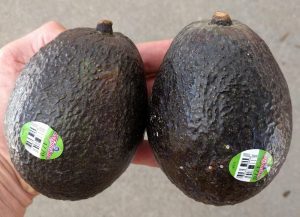
There is also the Reed avocado, which has almost the same season as Lamb: summer into fall. I’ve bought many Reed avocados at Whole Foods Markets in years past.
I asked my friends in Corvallis if they ever got avocados other than Hass at the co-op, and they remembered getting Bacon. Besides Lamb, Reed, and Bacon, I’ve seen some Fuerte avocados sold in select stores, for example at Bristol Farms. But I’ve never seen them in typical supermarket chain stores.
The seasons to find Bacon and Fuerte avocados are from about November through the end of winter.
Now, if you really want to find the best avocados to buy you’ll have to look beyond the grocery store . . .
Buy avocados at farmers markets
The advantage of buying avocados at a farmers market is that you can buy varieties other than Hass and that are in season, such as the ones mentioned above. But there are even more varieties to be found at farmers markets. I’ve bought Pinkerton, Edranol, Nabal, MacArthur, Corona, Anaheim, and other uncommon varieties at farmers markets throughout California over the years.
The disadvantage is that vendors tend to come and go. But visit the farmers markets near you and you might get lucky.
Buy avocados at farm stands
Farm stands are another great place to find less common varieties. Eli’s Farm Stand in Fallbrook, San Diego County, often carries Fuerte, GEM, Gwen, Reed, Lamb, and more, in addition to Hass. (Eli’s Farms also sells at the San Clemente and Corona Del Mar farmers markets in Orange County.)
Buy avocados online
Finally, a few California avocado growers have started selling their fruit directly through their own website or on Amazon, shipped to your door. I’ve bought from many of them in order to try them out, but at this stage I can’t recommend any, unfortunately.
Avocados ship very well if picked just before shipping and packed correctly. Many times, I’ve mailed avocados from my own trees to family who live out of state and the fruit has arrived in top shape so I know the method is feasible even at quite a distance.
The shipping does add to the cost, but I would be happy to pay, say, $4 per avocado if each avocado is perfect compared to $2 per avocado from a grocery store where half are likely to have some rot inside.
All of my Yard Posts are listed HERE

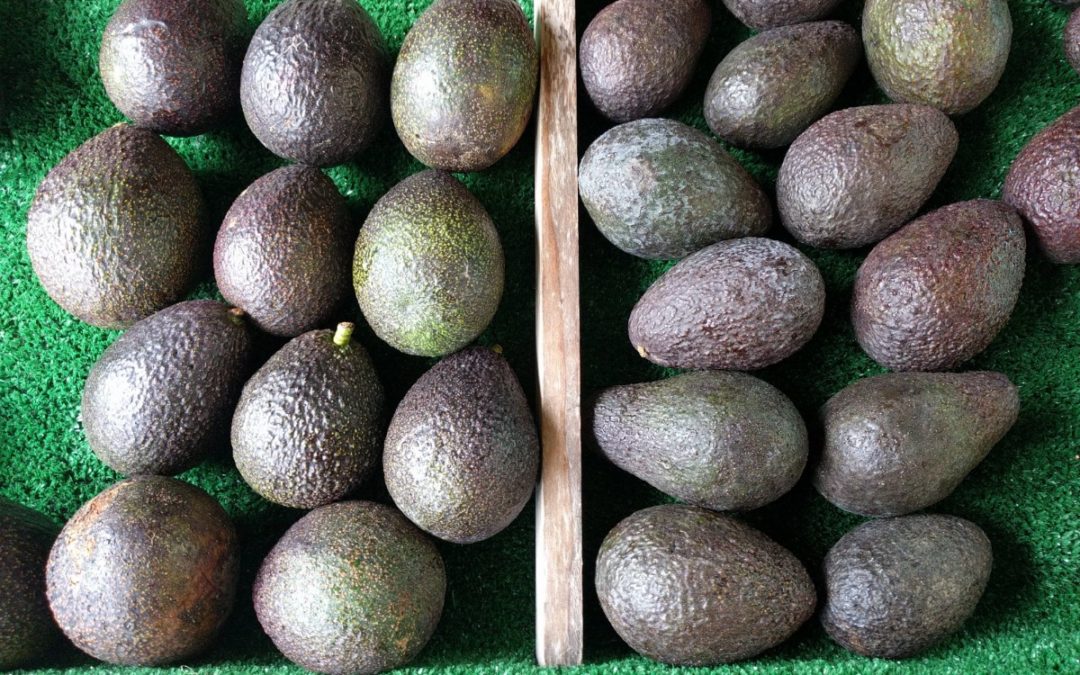
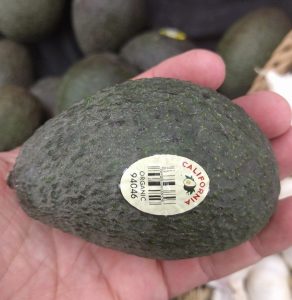
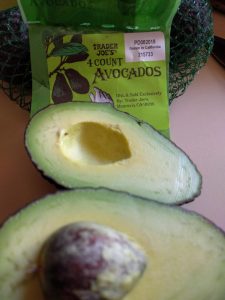
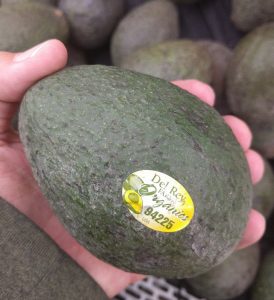
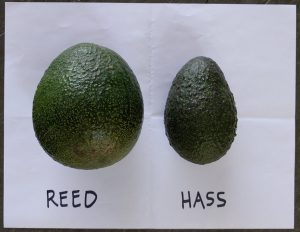
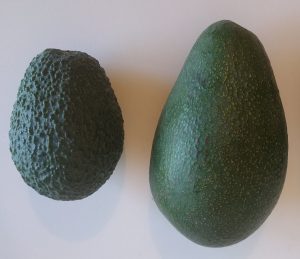
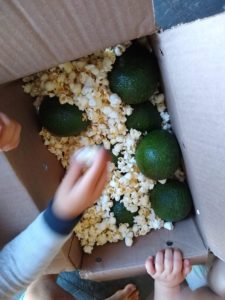

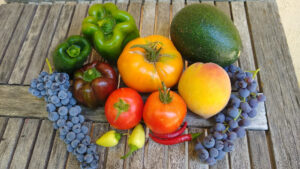
Hi Greg,
Thank you so much for your wonderful site and information!
I live in North Tustin and would like to plant an orange tree and possibly a tangerine tree as well.
Could you please tell me the best time of year to plant them? Also what is the best variety (sweetness, ease of growing, seedless) for a newbie like me?
Thank you so much!!!
Hi Susie,
In North Tustin you can plant a citrus any time of year although it can be most satisfying to plant one in late spring since the tree will quickly start putting out new growth after planting. I often plant in fall, about now in fact, because it’s easy to keep up the frequent watering necessary for the first few weeks and then let the winter rains take care of it until spring.
For my yard, I’ve chosen a Valencia orange and a Cara Cara navel orange. But it’s still hard to beat the classic Washington navel orange in terms of sweetness, being seedless, and easy peeling.
There are so many good tangerine varieties to choose from these days. I’m happy with all of mine: Kishu, Gold Nugget, Pixie, Satsuma, Dancy. But I like the first three the most because Satsumas are a little bland in my opinion and the Dancy has seeds.
Check out these posts for more details on my orange and tangerine choices, as well as links to more information to help you choose:
https://gregalder.com/yardposts/oranges-and-mandarins-fresh-off-the-tree-almost-all-year/
https://gregalder.com/yardposts/the-best-fruit-tree-for-kids-and-the-winner-is-kishu/
The last thing I’ll add is that if you only plant one orange and one tangerine, I’d choose varieties that have different harvest seasons. I’d probably choose Kishu and Cara Cara/Washington, for example, because then you can eat Kishus in the late fall through winter and eat oranges from the late winter through spring. Something like that.
Greg, would you mind sharing your method of shipping avocados? Thanks for your great posts!
Hi Nancy,
Here is how I mail a box of avocados:
I pick the avocados right before I mail them so that they’re as hard and tough as possible during the shipping.
I mail Monday, Tuesday, or maybe Wednesday, but no later in the week. This way the box of avocados arrives by Saturday and is not sitting around somewhere en route on a Sunday.
I use a Medium Flat Rate box through the U.S. Postal Service.
I fill the space around the avocados in the box with popcorn. I just pop the popcorn, let it cool, and pour it in. Popcorn works great as cushion and insulation, and it’s nice that it can eventually be an animal’s snack or compost.
Do you ever sell your own avocados?
Hi Ryan,
As of today, no. But I’ve been considering it.
For many years before I had property on which to grow my own avocados, I would get frustrated by California growers’ refusal to grow anything but Hass. It meant half the year eating junk avocados from other countries. I’ve thought it would be good to try to provide people with good avocados outside the six-month California Hass season.
Also, I always wished I could taste fruit of the varieties I was thinking of planting — before buying and planting a tree of that variety. Sometimes that’s near impossible. (Where are you going to buy a Fuerte avocado anymore let alone a Jan Boyce?) So I’ve thought it might be good to offer fruit of varieties other than Hass so people can taste them before choosing which kind to plant.
Hey Greg your yard posts are a good reading. I too am from California and grow my own avocado trees. I find it troubling and really hard to believe that you’ve never had a good avocado imported from Mexico. Although you cannot beat an avocado or any fruit directly from a tree in the backyard, California avocados dont come close in taste to an avocado from Mexico. I understand the problem with shipping and the avocados being spoiled at times, but to say that you’ve never had a good avocado from Mexico or that Californias avocados in general taste better is simply not true.
I strongly agree with you Robert
Hi Robert,
Thanks for writing. I can’t find where I said that I’ve never had a good avocado from Mexico. If I said that somewhere, I shouldn’t have — because it’s not true. I have had some very good avocados from Mexico. I’ve eaten them here in California as imports, in other countries that import from Mexico, as well as while travelling in Mexico itself.
When it comes to taste, I think it’s best not to communicate one’s opinions as though they are objective facts so I try to remember to mention that I’m describing something subjective when I talk taste. In fact, I try to just describe qualities of flavor or texture rather than using words like delicious or good. But it’s hard not to fall into doing that sometimes, as if what I think tastes good is the same as what others feel.
That being said, according to my own personal taste, I have never eaten an avocado grown in Mexico that tasted as good as the best avocados grown in California that I’ve eaten — whether from my own trees or other trees in California. It’s just my personal experience and taste preference. That’s all. The only avocados I’ve ever eaten that compare in taste to California-grown fruit are Fuertes grown in Spain.
But all of that just describes my personal taste preferences and limited experience as much as anything else. I don’t mean to imply that avocados grown in Mexico or any other country aren’t high quality or good tasting. Maybe I can emphasize the subjectivity of what I say about taste more.
To wit, just a couple weeks ago I was eating some Gwen avocados with a friend and he called them B-level while I was thinking they were absolutely top tier. He is very experienced in eating avocados. It made me pause and reassess my feelings about the Gwens, but it also reminded me of how slippery this taste topic is.
Thanks for responding Greg, everyone is going to have their opinion on the matter of how something tastes and what taste better. Having tried many varieties grown here compared to the ones I’ve had while traveling in Michoacan Mex. where avocados grow like weeds there’s no comparison in my opinion avocados from there are just naturally better but besides Mexico nobody else beats California avocados. Of course that is just my opinion.
Hey Greg
I wondered if anyone has seen the segment on how residents in other countries are unable to get drinking water due to theft for the purpose of growing high demands of avocados? Apparently, pipelines are being cut, and being re-connected to farms to produce the high demand in the United States. This broke my heart and so I’ve stopped eating and purchasing avocados as a result.
I see you recommend purchasing very hard
avocados so I wondered how you eat them? Also I saw a reel on placing avocados in water for three weeks and that softens them. Any input on this?
Thanks for all the great tips on avocados. If your selling them, I’ll buy em.
I don’t care much for the Hass avocado. The green skinned avocado was the kind I grew up eating, growing up here in Washington state in the 60s and early 70s. Now the only kind available is the horrid Hass avocado! I buy one every once in awhile if I am craving an avocado, and always end up disappointed when I taste it! Bring back the green skinned ones! They do grow them in the US, in Florida!
Good morning Greg, I hope you’re doing well!!
I have a small farm in Temecula ca I grow avocados, lemons, oranges, and cherymoya, I would like to know where could I sell the fruit? I’m kind of new at farming. Thank you.
Hi Mario,
I would start by contacting Dickinson Family Farms. They’re located in De Luz, and if they aren’t interested in buying your fruit they could still give you advice on where else to go. Best of luck!
Thank you Greg!!